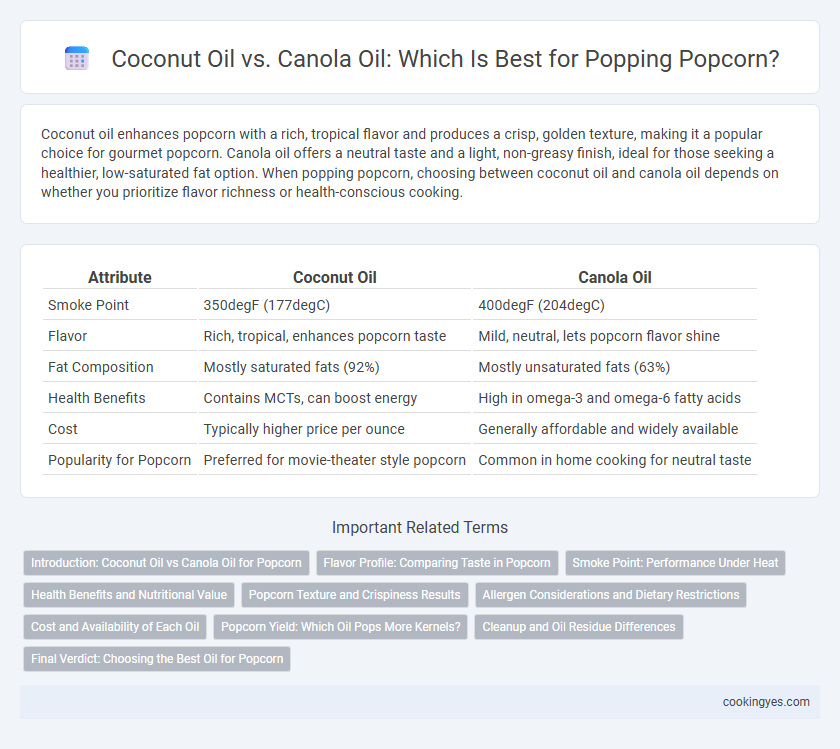Coconut oil enhances popcorn with a rich, tropical flavor and produces a crisp, golden texture, making it a popular choice for gourmet popcorn. Canola oil offers a neutral taste and a light, non-greasy finish, ideal for those seeking a healthier, low-saturated fat option. When popping popcorn, choosing between coconut oil and canola oil depends on whether you prioritize flavor richness or health-conscious cooking.
Table of Comparison
| Attribute | Coconut Oil | Canola Oil |
|---|---|---|
| Smoke Point | 350degF (177degC) | 400degF (204degC) |
| Flavor | Rich, tropical, enhances popcorn taste | Mild, neutral, lets popcorn flavor shine |
| Fat Composition | Mostly saturated fats (92%) | Mostly unsaturated fats (63%) |
| Health Benefits | Contains MCTs, can boost energy | High in omega-3 and omega-6 fatty acids |
| Cost | Typically higher price per ounce | Generally affordable and widely available |
| Popularity for Popcorn | Preferred for movie-theater style popcorn | Common in home cooking for neutral taste |
Introduction: Coconut Oil vs Canola Oil for Popcorn
Coconut oil offers a rich, natural flavor and high smoke point ideal for popping popcorn, enhancing its crisp texture and aroma. Canola oil provides a neutral taste with a high smoke point and lower saturated fat content, making it a heart-healthy alternative. Choosing between these oils depends on flavor preference and nutritional considerations in popcorn preparation.
Flavor Profile: Comparing Taste in Popcorn
Coconut oil imparts a rich, slightly sweet and nutty flavor to popcorn, enhancing its natural taste with a tropical aroma. Canola oil offers a more neutral, mild flavor, allowing the popcorn's natural corn taste to dominate without overpowering it. Choosing coconut oil results in a bolder, more flavorful snack, while canola oil maintains a lighter, cleaner taste.
Smoke Point: Performance Under Heat
Coconut oil has a smoke point of around 350degF (177degC), which provides stable heat for popping popcorn without burning quickly, enhancing flavor retention. Canola oil's higher smoke point, approximately 400degF (204degC), allows for better performance under higher temperatures, reducing the risk of smoke and burnt kernels. Choosing between coconut and canola oil depends on whether flavor emphasis or higher heat tolerance is preferred for popcorn popping.
Health Benefits and Nutritional Value
Coconut oil contains medium-chain triglycerides (MCTs) that may boost metabolism and support brain health, while canola oil is rich in heart-healthy monounsaturated fats and omega-3 fatty acids. Both oils have a high smoke point suitable for popping popcorn, but canola oil has a lower saturated fat content compared to coconut oil, making it a better choice for cardiovascular health. Nutritionally, coconut oil offers antioxidants like polyphenols, whereas canola oil provides vitamin E, an important antioxidant for skin and immune function.
Popcorn Texture and Crispiness Results
Coconut oil enhances popcorn texture by providing a rich, crispy exterior with a slightly nutty flavor due to its high saturated fat content, resulting in a crunchier bite compared to canola oil. Canola oil produces lighter, less greasy popcorn with a moderately crisp texture, owing to its higher unsaturated fat composition. The choice between coconut and canola oil significantly impacts popcorn crispiness and mouthfeel, with coconut oil favored for a more robust crunch.
Allergen Considerations and Dietary Restrictions
Coconut oil is free from common allergens like gluten and nuts but may trigger reactions in individuals with tree nut allergies due to cross-reactivity concerns. Canola oil is generally hypoallergenic, making it suitable for most dietary restrictions, including low-saturated-fat and heart-healthy diets. Selecting the right oil for popping popcorn depends on allergen sensitivity and specific dietary goals such as avoiding saturated fats or potential allergenic oils.
Cost and Availability of Each Oil
Coconut oil is generally more expensive than canola oil due to its tropical sourcing and higher production costs, making it less accessible in some regions. Canola oil, widely available and typically lower in price, is a cost-effective choice for popping popcorn in most grocery stores globally. The relative affordability and abundant supply of canola oil make it a popular option for budget-conscious consumers seeking reliable popcorn cooking oils.
Popcorn Yield: Which Oil Pops More Kernels?
Coconut oil produces a higher popcorn yield compared to canola oil due to its higher smoke point and ability to coat kernels evenly, resulting in fewer unpopped kernels. Canola oil's lighter texture sometimes leads to uneven heating, causing more kernels to remain unpopped. Studies show that popcorn popped in coconut oil typically achieves 90-95% kernel expansion, while canola oil yields around 80-85%.
Cleanup and Oil Residue Differences
Coconut oil leaves a thicker, stickier residue on cookware compared to canola oil, making cleanup more challenging and often requiring more intensive scrubbing or soaking to remove. Canola oil, with its lighter consistency, tends to burn off more cleanly, resulting in less stubborn buildup and faster, easier cleanup after popping popcorn. Choosing canola oil minimizes post-cooking residue, reducing greasy spots and saving time during kitchen maintenance.
Final Verdict: Choosing the Best Oil for Popcorn
Coconut oil imparts a rich, buttery flavor and achieves a high popping temperature, resulting in crisp, evenly popped kernels, while canola oil offers a neutral taste and heart-healthy monounsaturated fats with a slightly lower smoke point. For classic theater-style popcorn with robust flavor, coconut oil is preferred, whereas canola oil suits those seeking a lighter, healthier option. Ultimately, the best oil depends on flavor preference and health priorities, with coconut oil excelling in taste and canola oil in nutritional profile.
Coconut Oil vs Canola Oil for Popping Popcorn Infographic

 cookingyes.com
cookingyes.com